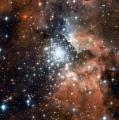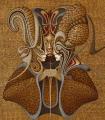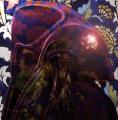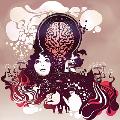
DMT-Nexus member
  
Posts: 3555 Joined: 13-Mar-2008 Last visit: 07-Jul-2024 Location: not here
|
Hey nexians. Haven't been around much lately but decided to summarize some of the imaginary theoretical work SWIM has thought up about jungle spice. I'll avoid the technical details and summarize the results as simply as possible.
Anyway here is the imaginary information:
SWIM has taken a number of analytical approaches analyzing the substance extracted from mimosa hostillis known as jungle spice. SWIM has compared mimosa hostillis extracted with nothing but methanol (cold for a week in dark) and jungle spice prepared by A/B and STB methods usually employing acetic acid as acid and toluene as organic solvent. SWIM has also cleaned up jungle spice multiple times with hexane and reanalyzed the material.
The analytical approaches used have been: HPLC with UV (PDA) detection and GC-MS.
When one analyzes mimosa extracted cold with methanol by HPLC 3 compounds are apparent with very similar UV spectra. When compounds have the same (or very similar) UV spectra it means they have a similar chromaphore which means there is some aspect to their structure that is very similar. Anyway one of these compounds is DMT, the other is yuremamine, and one other compound is present that SWIM thinks is a beta-carboline or NMT (See MS discussion). The ratio is something like this dmt (66%), yuremamine (28%) and other alkaloid (6%).
When one analyzes jungle spice made by STB or A/B methods two main compounds are visible. DMT and the other alkaloid. There are some very very minor peaks but basically thats the majority of whats observed. Ratio is about 95% DMT and 5% other alkaloid.
When one analyzes jungle spice by GC-MS DMT is the major compound. Two other compounds can be observed NMT and 2-methy-1,2,3,4-tetrahydro-beta-carboline. However since some compounds are not analyzable by GC because they are not volatile SWIM decided to derivitize the extract with a trimethylsilyating (TMS) reagent and analyze it again. By using N-Methyl-N-trifluoroacetamide (MSTFA) with 1% trimethylchlorosilane (TMCS) this reagents reacts to interchange protons on functional groups like OH (also works on amines etc many functional groups) with a trimethylsilicon (TMS) group. Derivitizing with these reagents has a number of advantages for analysis on GC. It improves thermal stability of compounds, it improves their volatility (by reducing intramolecular forces such as hydrogen bonding on functional groups), it also can improve chromatographic separation, and finally it aids in structure elucidation.
Anway if one analyzes jungle spice after MSTFA + 1% TMCS derivitization the following can be observed. DMT and its TMS derivatives, that beta-carbolines TMS derivative, a few organic acids at least one fatty acid and at least one phenolic compound. A number of small amines and indole like structures are also present but these are most likely artifacts of the reaction (thats normal).
Finally the conclusion from all these experiments is that jungle spice is mostly DMT! SWIM has said this before but after following up these experiments with newer experiments and other approaches SWIM firmly believes the psychoactivity of this extract is mostly from DMT. The increase in potency could be explained many ways but all would be speculative. Maybe there is potentiation (although I doubt it because of low concentrations of other alkaloids) or maybe DMT vaporizes better for some reason when its in jungle spice.
The difference in color and consistency of these extracts probably has much to do with varying ratios of the alkaloids and other compounds like fatty acids and organic acids that were observed. The so called differences in effects compared with DMT are probabaly largely subjective or dose related but again thats speculative.
Basically when people say jungle spice is "another alkaloid" they are wrong. Its DMT. This is important for those who extract it to realize because it means there is a lot more DMT still present in your extract. SWIM has cleaned up the extract 3 times with hexane and DMT is still present. SWIM will try and fully exhaust the material of DMT and analyze again but that might be very difficult if not impossible without chromatography.
|
|
|
|
|

DMT-Nexus member
Posts: 2354 Joined: 24-Jan-2010 Last visit: 21-Jun-2012 Location: Massachusetts
|
Wow, this is awesome work that you've done burnt! Thank you for sharing it! PK Dick is to LSD as HP Lovecraft is to Mushrooms
|
|
|

DMT-Nexus member
Posts: 776 Joined: 27-Jan-2010 Last visit: 07-Aug-2019 Location: uk
|
You are a legend ... thanks, Burnt, this is great to know. "at journey's end, we must begin again"
|
|
|
DMT-Nexus member
Posts: 369 Joined: 27-Apr-2009 Last visit: 09-Dec-2011 Location: nexus
|
Ah burnt, thank you so much! Jungle spice is my favorite because of the simple process (strong solvent => fumarate precip), and it's very good to know that it's still good ol' fashioned DMT. This means the safety research done on DMT still applies to jungle spice! My next journey will launch with an even bigger smile thanks to you 
|
|
|

DMT-Nexus member

Posts: 4733 Joined: 30-May-2008 Last visit: 13-Jan-2019 Location: inside moon caverns
|
This is really groundbreaking. Let me thank you for your workt burnt, very nice!!!
|
|
|

DMT-Nexus member
  
Posts: 3555 Joined: 13-Mar-2008 Last visit: 07-Jul-2024 Location: not here
|
Glad its helpful. The only thing SWIM hasn't imagined is what its like if one extracts with d-limonene. Although from reports of consistency and effects of material and for structural / selectivity reasons SWIM believes is very similar to toluene or diethyl ether extracts.
|
|
|
DMT-Nexus member

Posts: 351 Joined: 25-Jul-2009 Last visit: 25-May-2016 Location: Europe
|
Burnt, given the last comment on the bark not being exausted from DMT so easily at least from the imaginary analysis of the theoretical pulls you mentioned, could an improved algorithm for theoretical extractions be devised that can exaust the material (i.e. different solvents) ? Or is it more or less a matter of multiple pulls?
|
|
|

DMT-Nexus member
  
Posts: 3555 Joined: 13-Mar-2008 Last visit: 07-Jul-2024 Location: not here
|
SWIM means dmt is not being exhausted fully from jungle spice. So is swimmers extract jungle spice first and try to clean it up do it many times to get all the material out.
SWIM thinks its best to go from a stronger less selective solvent like toluene or d limo and then use hexane or naptha to clean up that jungle spice residue. when extracting from the bark. swim hasn't directly compared same batches of bark using different approaches (naptha versus toluene etc) for quantitative yield though so can't say for sure.
only thing can say for sure is if you have jungle spice and you smoke it and it gets you high theres very significant amounts of dmt left in it.
also SWIM forgot to mention this but SWIM hasn't seen any evidence for dmt n oxide. one of the minor peaks in HPLC could be dmt oxide but without reference swim has no way to be sure.
where does the idea that dmt n oxide is present come from? how can one make dmt n oxide?
|
|
|

DMT-Nexus member
 
Posts: 108 Joined: 04-Mar-2010 Last visit: 11-May-2010
|
burnt use hydrogen peroxide to oxidize dmt that should give pretty consistent results
anyway..im really excited about this stuff..now im gonna have to do a methanol or ethanol extraction and see what yuremamine really is like
|
|
|

DMT-Nexus member
  
Posts: 3555 Joined: 13-Mar-2008 Last visit: 07-Jul-2024 Location: not here
|
^^Just so you know. It seems unstable. SWIM did a very fast STB once on very small amount of material and still detected it but when doing normal A/B or STB its always gone.
|
|
|
DMT-Nexus member
Posts: 7 Joined: 10-Nov-2008 Last visit: 05-Aug-2025 Location: Holland
|
This suprises me, never used jungle bur always read stories here about for more potent and different effect and now it;s just NN-dmt? So everything was placebo? and it's not more potent?
|
|
|

Kalt und Heiß, Schwarz und Rot, Kürper und Geist, Liebe und Chaos
 
Posts: 4661 Joined: 02-Jun-2008 Last visit: 30-Apr-2022
|
Jahvisions wrote:This suprises me, never used jungle bur always read stories here about for more potent and different effect and now it;s just NN-dmt? So everything was placebo? and it's not more potent? No, nobody said that. burnt just says that there is really not much in the jungle spice other than dmt. Very few minor other compounds but basically it is nnDMT. Besides, teh jungle spice experience is basically a dmt-based experience, maybe modified to some (or great) extent. It could be other oils or compounds that help better vaporise the dmt/better absorb ot/better make it cross the blood brain barrier/better improve its half-life, better improve its interaction with receptors etc... Imagine it maybe as some carrier vehicle for dmt (like liposomes carry stuff efficiently through body and cell membranes)
burnt, did SWIY have any cut-off point for the mass spec spectral analysis? (like MW zero to 1000) or was it basically zero to almost "infinite" MW? Could SWIY detect compounds of, say a MW of 5000? Need to calculate between salts and freebases? Click here! Need to calculate freebase or salt percentage at a given pH? Click here!
|
|
|

DMT-Nexus member
  
Posts: 3555 Joined: 13-Mar-2008 Last visit: 07-Jul-2024 Location: not here
|
infund yes there is a cut off and its about 600 amu. SWIM has one instrument that can go up to 1000 but didn't use it.
Anyway yes my major conclusion is that no other ALKALOIDS appear to be present. There is certainly some fatty acids and organic acids present. Still this analysis would miss heavier compounds like polymers or very large tannins / lignans. Lignans would be tough to detect using such approaches.
SWIM is working on getting a mass balance so that the "impurities" percent mass can be known. However even after washing jungle spice 4x with boiling hexane and crashing out freebase as fumarate salts guess what? Theres still mostly DMT!!!!! AAAHHHHHHHH
|
|
|

DMT-Nexus member

Posts: 14191 Joined: 19-Feb-2008 Last visit: 22-Nov-2025 Location: Jungle
|
Question to the chem people. So in TIHKAL, shulgin describes the synthesis of DMT and at some point he states: " There was thus obtained 0.40 g of dimethyltryptamine (DMT) with a mp 67-68 °C. The distillate contained about 3% of 2-Methyl-1,2,3,4-tetrahydro-b-carboline (parent peak mass 186, major peak mass 186) as an impurity which was lost upon recrystallization."
Now, how did that end up in there? Is it a coincidence that the jungle analysis have about same percentage of this substance? Is it because the pathway of the mimosa plants synthesis of alks is very similar to the way shulgin used? Anybody can draw up what this b-carboline looks like so that we see how it compares to DMT?
|
|
|
DMT-Nexus member

Posts: 351 Joined: 25-Jul-2009 Last visit: 25-May-2016 Location: Europe
|
Hmm i think carbolines are easy to form via the Pictet Spengler reaction/route. It really doesnt take much... Have alook at this : http://en.wikipedia.org/...2%80%93Spengler_reaction
|
|
|

DMT-Nexus member
Posts: 1760 Joined: 15-Apr-2008 Last visit: 06-Mar-2024 Location: in the Forest
|
very interesting and important information, thank you The only way of discovering the limits of the possible is to venture a little way past them into the impossible. Arthur C. Clarke http://vimeo.com/32001208
|
|
|

DMT-Nexus member
  
Posts: 3555 Joined: 13-Mar-2008 Last visit: 07-Jul-2024 Location: not here
|
Quote:Question to the chem people. So in TIHKAL, shulgin describes the synthesis of DMT and at some point he states: " There was thus obtained 0.40 g of dimethyltryptamine (DMT) with a mp 67-68 °C. The distillate contained about 3% of 2-Methyl-1,2,3,4-tetrahydro-b-carboline (parent peak mass 186, major peak mass 186) as an impurity which was lost upon recrystallization."
Now, how did that end up in there? Is it a coincidence that the jungle analysis have about same percentage of this substance? Is it because the pathway of the mimosa plants synthesis of alks is very similar to the way shulgin used? Anybody can draw up what this b-carboline looks like so that we see how it compares to DMT? Thats interesting. SWIM was thinking this compound was an artifact but isn't sure yet. Maybe an artifact of yuramamine degradation or maybe an artifact of analysis (ie heating since in GC). One could check the reaction mechanism in the biosnythetic pathway if its known.
|
|
|
DMT-Nexus member
Posts: 9 Joined: 11-Apr-2008 Last visit: 30-Oct-2025 Location: Michigan
|
It may be only 5% or less of an impurity (in 2006 i had a friend analyze by LCMS different samples, there is discussion in other jungle threads about it), but I still think its enough to "ruin" the DMT trip (i call it ruin because thats exactly how it was for me, not only bad but a terrible freaky dark trip). Odd though that only a few mg's along with the DMT can cause such a strong reaction.. potent i guess. Gosh. I really really REALLY want to try extracting again, but I just figure that when I do, its gonna have this crap in it. Back in 2005 or before was anybody talking about jungle spice?? Back then, every batch was perfect, and I had it analysed (before I even started getting any dark/jungle type of trips) and it was 99.9% DMT (via the same method used to analyse the jungle stuff, LCMS). I just don't know, the only explanation I can think of is that mimosa suppliers started supplying a different type...
If you like any of my posts or past time spent (doing LCMS on different mimosa bark sparked debate & more analysis, and if you love 4-AcO-DMT I got the original first fumarate salt synthesis! From China in '06, I made no profit from that one [can post proof of original email] Please keep me in mind for donation. Financial situation not good looking to stay above water. Trying to start an online business need all the help I can get - even a loan to get started! If enough people sent 50 cents worth of BTC....
bitcoin: 129MJ3sixDzAneVYWuXwp2mbTNdZoEqCXT
|
|
|

omnia sunt communia!

Posts: 6024 Joined: 29-Jul-2009 Last visit: 11-Jun-2025
|
radio879 wrote: I just don't know, the only explanation I can think of is that mimosa suppliers started supplying a different type... It's most likely (having not used bark from "back then" ) nothing to do with the bark and solely to do with the solvent used to extract the material. A more selective solvent such as naptha or heptane will pull the pure spice you refer to. A less selective solvent such as xylene or d-limonene will pure fullrange spice, with its "impurities". This is true now and to my mind would have been true in the past as well. The bark has probably always (as far as kitchen extractors are concerned) had these alkaloids in it, people just weren't using solvents that would pull them. Imo, fullrange spice is very similar to changa or dmt+dmt n-oxide-with-a-twist, it's neither an inherently light or dark trip, it depends what you bring to it (as with all the entheogens I've used). Wiki • Attitude • FAQThe Nexian • Nexus Research • The OHTIn New York, we wrote the legal number on our arms in marker...To call a lawyer if we were arrested. In Istanbul, People wrote their blood types on their arms. I hear in Egypt, They just write Their names. גם זה יעבור
|
|
|

DMT-Nexus member

Posts: 14191 Joined: 19-Feb-2008 Last visit: 22-Nov-2025 Location: Jungle
|
Spiceman wrote:Extracts made with Di-ethyl ether yeild something very diffrent from your everyday run of the mill jungle spice. Perhaps it is this "5% mystery alkaloid" in relatively pure form. The major point is that this compound is NOT soluble in naptha ... this alkaloid or whatever is extremely psycho-active and is nothing like dmt. It is NOT soluble in naptha.... dmt is... so this is obviously not DMT. why still call it mystery alkaloid and not name the other alkaloid as 2-methyl-1,2,3,4-tetrahydro-bcarboline? and if thats it, then yes at least according to xlogp it would make sense that its not naphtha soluble, as you can see in the [url=https://wiki.dmt-nexus.me/Psychedelic_Alkaloids_Chemical_and_Physical_Properties#Solvents_and_Alkaloids_XlogP_and_XlogP3]psychedelic compounds information wiki[/url it has a xlogp of 1.7, same as dmt n-oxide which is also not soluble in naphtha. But is 2-MTHBC indeed psychoactive? Or maybe in synergy it modulates dmt experience? And does di-ethyl ether really extract it in pure form? And is it possible that you're just self-suggesting the different effects, or that maybe what diethyl ether extracts is some kind of inactive compound that protects dmt and makes the vaporization more effective therefore seeming like something different? Did you make a blind test with this compound to see if you can really notice a difference between it and dmt? and if not, would you be willing to, maybe also with someone else to also make the test? One could, for example, dissolve it in some inactive herbs to mask the taste and looks, ask a third person to make codes on the container to later find out which is which, and make a few successive launches (so that there is a statistical significance in the results and not just one isolated test with one person).. The results of this kind of test would be deeply appreciated
|